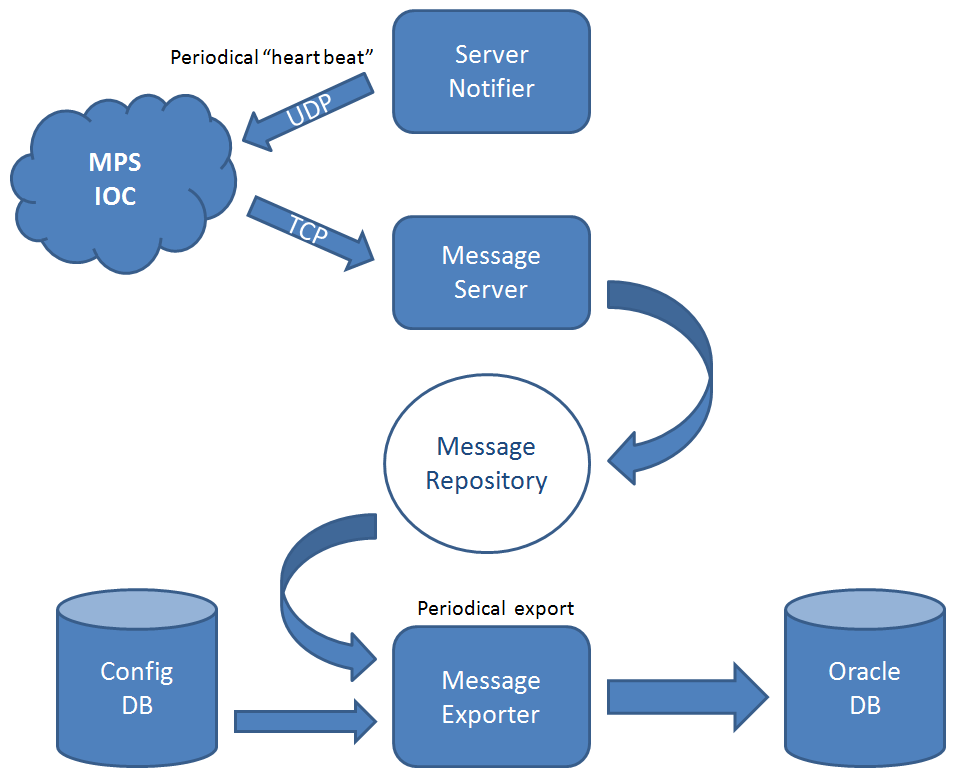Setup
Environment
- Effectively, you can only develop MPS History Server inside Eclipse on lcls-builder.
- Check out the CVS module physics/mps/mpshist into your workspace
- From now on, the root of project is referred to as $MPSHIST_ROOT
...
- Select $MPSGUI_ROOT/src/edu.stanford.slac.mpshist/MpsHistManager
- Right-click => select Run As... => Java Application
- If you run the app for the first time, it should fail
- Go to Run in the Window menu
- Select "Open Run Dialog..."
- Select "MpsHistManager" in the window on the left
- Select the "Arguments" tab
- Enter the following arguments:
Code Block /usr/local/lcls/epics/iocTop/MachineProtection/mpsConfiguration/database/XYZ/mpsdb.sqlite3 password
- XYZ - the current Config version (caget IOC:BSY0:MP01:DBVERS)
- password - the current password (see also #Launch Script)
in the "Program arguments" area.
- Press "Run"
- Note: to actually receive messages, you have to stop the production server (see #Starting and Stopping)
Development
Overview
Launch Script
- mpshist under $MPSHIST_ROOT
- Gets the current version of the Config DB
- Assembles the path to it
- Sets up the CLASSPATH
- Runs MpsHistManager and tells the process to write all message into a log file
Classes and Functions
Message
edu.stanford.slac.
...
mpshist.
...
message.
...
Message
- Java representation of an MPS message
| Code Block |
|---|
///****************************************************************************
// * Data Pointers
// ****************************************************************************/
///* Note: The history message header begins at the first byte of TCP Data
// */
//
//#define HISTORY_MESSAGE_HEADER_SECTION_POINTER(_pointerToFullMessage) ((epicsInt8 *)(_pointerToFullMessage) + 0)
//#define HISTORY_MESSAGE_PROTOCOL_VERSION_POINTER(_pointerToHistoryHeader) ((epicsUInt8 *)(_pointerToHistoryHeader) + 0)
//#define HISTORY_MESSAGE_TYPE_POINTER(_pointerToHistoryHeader) ((epicsUInt8 *)(_pointerToHistoryHeader) + 1)
//#define HISTORY_MESSAGE_DATA_SECTION_POINTER(_pointerToHistoryHeader) ((epicsInt8 *)(_pointerToHistoryHeader) + 2)
//
//#define HISTORY_MESSAGE_PROTOCOL_VERSION(_pointerToHistoryHeader) (*HISTORY_MESSAGE_PROTOCOL_VERSION_POINTER(_pointerToHistoryHeader))
//#define HISTORY_MESSAGE_TYPE(_pointerToHistoryHeader) (*HISTORY_MESSAGE_TYPE_POINTER(_pointerToHistoryHeader))
//
///****************************************************************************
// * Super Message
// ****************************************************************************/
///* All history message struct data.
// */
//
//
//
//#define HISTORY_SUPER_MESSAGE_SIZE (16 + MPSHistoryProtocolHeaderSize)
//
//#define HISTORY_SUPER_TIMESTAMP_SECPASTEPOCH_POINTER(_pointerToHistoryData) ((epicsUInt32 *)((_pointerToHistoryData) + 0))
//#define HISTORY_SUPER_TIMESTAMP_NSEC_PULSEID_POINTER(_pointerToHistoryData) ((epicsUInt32 *)((_pointerToHistoryData) + 4))
//#define HISTORY_SUPER_TIMESLOT_POINTER(_pointerToHistoryData) ((epicsUInt8 *)((_pointerToHistoryData) + 8))
//#define HISTORY_SUPER_TYPE_POINTER(_pointerToHistoryData) ((epicsUInt8 *)((_pointerToHistoryData) + 9))
//#define HISTORY_SUPER_ID_POINTER(_pointerToHistoryData) ((epicsUInt32 *)((_pointerToHistoryData) + 10))
//#define HISTORY_SUPER_OLD_VALUE_POINTER(_pointerToHistoryData) ((epicsUInt32 *)((_pointerToHistoryData) + 14))
//#define HISTORY_SUPER_NEW_VALUE_POINTER(_pointerToHistoryData) ((epicsUInt32 *)((_pointerToHistoryData) + 18))
//
//#define HISTORY_SUPER_TIMESTAMP_SECPASTEPOCH(_pointerToHistoryData) (*HISTORY_SUPER_TIMESTAMP_SECPASTEPOCH_POINTER(_pointerToHistoryData))
//#define HISTORY_SUPER_TIMESTAMP_NSEC_PULSEID(_pointerToHistoryData) (*HISTORY_SUPER_TIMESTAMP_NSEC_PULSEID_POINTER(_pointerToHistoryData))
//#define HISTORY_SUPER_TIMESLOT(_pointerToHistoryData) (*HISTORY_SUPER_TIMESLOT_POINTER(_pointerToHistoryData))
//#define HISTORY_SUPER_TYPE(_pointerToHistoryData) (*HISTORY_SUPER_TYPE_POINTER(_pointerToHistoryData))
//#define HISTORY_SUPER_ID(_pointerToHistoryData) (*HISTORY_SUPER_ID_POINTER(_pointerToHistoryData))
//#define HISTORY_SUPER_OLD_VALUE(_pointerToHistoryData) (*HISTORY_SUPER_OLD_VALUE_POINTER(_pointerToHistoryData))
//#define HISTORY_SUPER_NEW_VALUE(_pointerToHistoryData) (*HISTORY_SUPER_NEW_VALUE_POINTER(_pointerToHistoryData))
|
edu.stanford.slac.mpshist.message.MessageRepository
- A singleton that caches MPS messages before they are exported to Oracle
Other
edu.stanford.slac.mpshist.MessageCounter
- A thread-safe way to count messages, both received and exported, and periodically put the numbers into cmlog
- Primarily used for debugging
edu.stanford.slac.mpshist.MessageExporter
- An instance of Runnable that periodically saves messages to the Oracle DB
edu.stanford.slac.mpshist.MessageServer
- An instance of Runnable that caches messages from MPS in memory
- Tries to create a ServerSocket bound to a port specified as an argument to the constructor
edu.stanford.slac.mpshist.MpsHistManager
- The main class
- Loads the Config DB via MPS Config
- Creates an instance of #edu.stanford.slac.mpshist.MessageExporter
- Tries to create an instance of #edu.stanford.slac.mpshist.MessageServer on ports 1 through 10
- Notifies MPS that an instance of MPS History Server server is up
edu.stanford.slac.mpshist.MpsHistProperties
- Contains (almost) all parameters and settings for the module
- Including the address of the MPS IOC that sends messages
Code Block public static final InetSocketAddress SOCKET_ADDRESS = new InetSocketAddress("ioc-bsy0-mp01.slac.stanford.edu", 30000);
- Including the address of the MPS IOC that sends messages
edu.stanford.slac.mpshist.ServerNotifier
- A runnable that periodically notifies MPS about a running server
- Sends out Datagram packets
- Monitors current Macro state numbers from IOC:BSY0:MP01:TTBLST.VALA
- Bypasses faults to a value for a time duration
- Monitors bypassed faults and end times
- Given a fault name, gets current state, type, and timestamp
of the fault - Given a PV, gets beam rate names (MPS and actual)
- Translates between EPICS and Java time
edu.stanford.slac.mps.jdbc.JDBCMonitor
- Loads all data from Config/Logic DB
- Config DB URL prefix: jdbc:sqlite:/usr/local/lcls/epics/iocTop/MachineProtection/mpsConfiguration/database/
- Logic DB URL prefix: jdbc:sqlite:/usr/local/lcls/epics/iocTop/MachineProtection/mpsConfiguration/algorithm/
- Checks periodically for new versions
- Current Config DB version is stored in IOC:BSY0:MP01:DBVERS
- Current Logic DB version is stored in IOC:BSY0:MP01:ALGRNAME
edu.stanford.slac.mps.jdbc.config.ConfigDB
- Singleton
- Serves as a facade to information about faults
- SQL queries are in the file sqlite.properties in the package edu.stanford.slac.mps.jdbc.config
edu.stanford.slac.mps.jdbc.logic.LogicDB
- Singleton
- Serves as a facade to information about Macros (and states), ignore conditions, current MacroStates
- SQL queries are in the file sqlite.properties in the package edu.stanford.slac.mps.jdbc.logic
Release with Eclipse
- Add a note in $MPSGUI_ROOT/RELEASE_NOTES
- Increment the tag version accordingly
- Commit to CVS
- Tag with mpsconfig-R#-#-#
- Check out the tagged version into production
Code Block cd $PHYSICS_TOP/release cvs co -r mpsconfig-R#-#-# -d mpsconfig-R#-#-# physics/mps/mpsconfig
- Select File => New Java project => Create project from existing source
- Select $PHYSICS_TOP/release/mpsconfig-R#-#-#
- Name the project mpsconfig-R#-#-#
- Press "Finish"
- Right-click on the new project mpsconfig-R#-#-# => Export...
- Select Java => JAR file
- Check mpsconfig-R#-#-# in "Resources to export"
- Check "Export generated class files and resources"
- As the export destination, type (and/or select)
Code Block $PHYSICS_TOP/release/mpsconfig-R#-#-#/jar/mpsconfig.jar
- Press "Finish"
- Move the symbolic link
Code Block cd $PHYSICS_TOP/ rm -rf mpsconfig; ln -s release/mpsconfig-R#-#-# mpsconfig
- Launch MPS GUI from lclshome
- MPS Global => MPS GUI...
- MPS Global => MPS CUD...
MPS History Server (mpshist) is a server application for saving MPS messages to Oracle.
...
- Beam destination: Beam destination changed from PREVIOUS DESTINATION_NAME to CURRENT DESTINATION_NAME
- Beam rate: Beam rate rate after DEVICE_NAME changed from PREVIOUS RATE_NAME to CURRENT RATE_NAME
- Fault: DEVICE_NAME FAULT_NAME changed from PREV_STATE to CURR_STATE
- Bypass time: DEVICE_NAME FAULT_NAME is bypassed for BYPASS_TIME_IN_SECONDS sec OR DEVICE_NAME FAULT_NAME bypass had cleared
- Bypass value: DEVICE_NAME FAULT_NAME changed from PREV_VALUE to CURR_VALUE
User's Guide
Scripts
Check nohup.out, /u1/lcls/tools/mpsHistoryServer/mpshist.log
You have to run mpshist on lcls-daemon2 as laci
| Code Block |
|---|
/etc/rc3.d/S99st.mpshist start
|
To stop mpshist
...
...
Troubleshooting
Is the server running?
...
